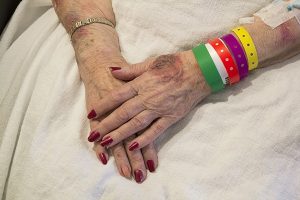
Knowing the risk factors for elderly abuse can make senior loved ones less vulnerable to abuse and neglect.
Providing the helping hand that empowers seniors to stay healthy, independent, and happy is the intent of not only our professional senior care staff, but of most family caregivers as well. Because the quality of life of older adults is so important to us, it’s crucial that we review a topic that can be really difficult for many of us to even imagine – elder abuse.
The CDC shares that nearly 500,000 older individuals are abused or neglected on a yearly basis in the U.S. However, countless other elder abuse cases are presumed to go unreported each year, which is why it’s important for family members to be familiar with possible abuse risks.
Below are a few of the risk factors for elderly abuse:
- Dependency on others: Older individuals who need others for care are typically unlikely to report abuse, as they may feel vulnerable or that their care needs won’t be able to be met by others if the abuser is reported.
- Decreased physical health and mobility: Dementia, Alzheimer’s or other impairments may increase a senior’s chance of being abused because they may be incapable of describing or verbalizing the abuse.
- History of abuse: If the senior was abusive as a parent, there is an increased likelihood for elder abuse, specifically if an adult child who was abused by the older adult is the main care provider.
- Social isolation: Social isolation sometimes results when a senior loses a spouse or lives at a distance from friends and family, and it can lead to the perfect setting for elder abuse. Abusers quite often try to keep older adults isolated by:
- Refusing to find financial aid or services
- Resisting outside support
- Changing social and healthcare providers over and over again to make it difficult to evaluate the older person’s health status
- Controlling contact with the senior
- Family caregiver burnout or stress: Overloaded caregivers can become frustrated, causing them to lash out at the older individuals in their care.
If a loved one is being cared for by a family member, friend, or other caregiver, be conscious of these risk factors for elderly abuse, call or visit as often as possible to evaluate the senior’s health, and play an active role in his or her care.
At Advanced Home Health Care, we know how important a senior loved one’s health and wellbeing are, and we go to great lengths to ensure we provide the best care. Every member of our senior care team has gone through an in-depth background check, reference checks, and a personal interview to confirm they meet our high care standards.
Contact us today at 800.791.7785 to learn more about our West Point, IA home health care services. For a full list of the communities where we provide care, visit our service area page.

